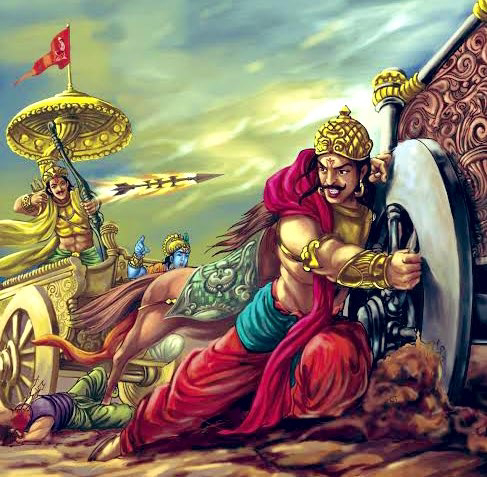King Karna: A Tragic Hero of Mahabharata
In Indian mythology, few characters are as complex and compelling as Karna from the epic Mahabharata. His life is a poignant tale of loyalty, valor, and the often-cruel play of destiny. Karna’s story isn’t just an integral part of Indian culture; it has also resonated in international literature, capturing the imagination of writers and scholars across the world.
Karna was born to Kunti, the mother of the Pandavas, before her marriage. Fearing societal censure, Kunti set the baby adrift in a basket on a river. The child, blessed with an armor (‘Kavach’) and earrings (‘Kundal’) by his father, the Sun God, was found and raised by Adhiratha and Radha, a charioteer's family.
This twist of fate deprived Karna of his rightful place among princes. Despite his royal blood, he was often subjected to scorn because of his perceived lowly birth. The burning desire to prove his worth and achieve what he believed was rightfully his shaped much of Karna's life.
Karna's skills in archery and warfare were unmatched, yet he was denied training by Dronacharya, the guru of the Pandavas and Kauravas, because of his assumed low caste. This rejection led him to the great Parashurama, who taught him but later cursed him when he discovered Karna's true lineage.
At the martial exhibition organized by Dronacharya, Karna entered to challenge Arjuna, the best archer of the Pandavas. Duryodhana, seeing his potential and aware of his rivalry with Arjuna, immediately offered him the kingship of Anga, thus binding Karna to the Kauravas by gratitude and friendship. This moment was pivotal, for it was not just skill or ambition that drove Karna towards the Kauravas, but also the need for acceptance and honor, something he found in Duryodhana’s gesture.
Karna’s life was a constant struggle between his personal morals and his loyalty to Duryodhana. He was aware of the adharma (unrighteousness) associated with the Kauravas' actions but remained steadfast in his support, driven by his sense of indebtedness. This complex moral positioning makes Karna one of the most human characters in the Mahabharata, embodying the grey shades inherent in all of us.
Before the great war of Kurukshetra, Karna discovered his true parentage. Despite knowing that he was fighting against his own brothers, he chose loyalty over blood, further solidifying his image as a tragic hero. In the war, he fought valiantly but was ultimately killed, owing in part to the curses that had shadowed his life.
Karna’s story transcends cultural boundaries, often compared to tragic heroes in Western literature like Oedipus and Achilles. His life is a rich canvas for exploring themes of fate, morality, and social justice. Modern retellings and analyses, both in India and internationally, often focus on Karna's inner conflicts and the societal constructs that led to his tragic downfall.
Karna remains one of the most intriguing and human characters of the Mahabharata. His story is a poignant reminder of the complexity of human nature and the often-unfair play of destiny. Karna's life resonates not just as a tale from mythology but as a mirror reflecting the eternal struggles of duty, honor, and personal morals.


